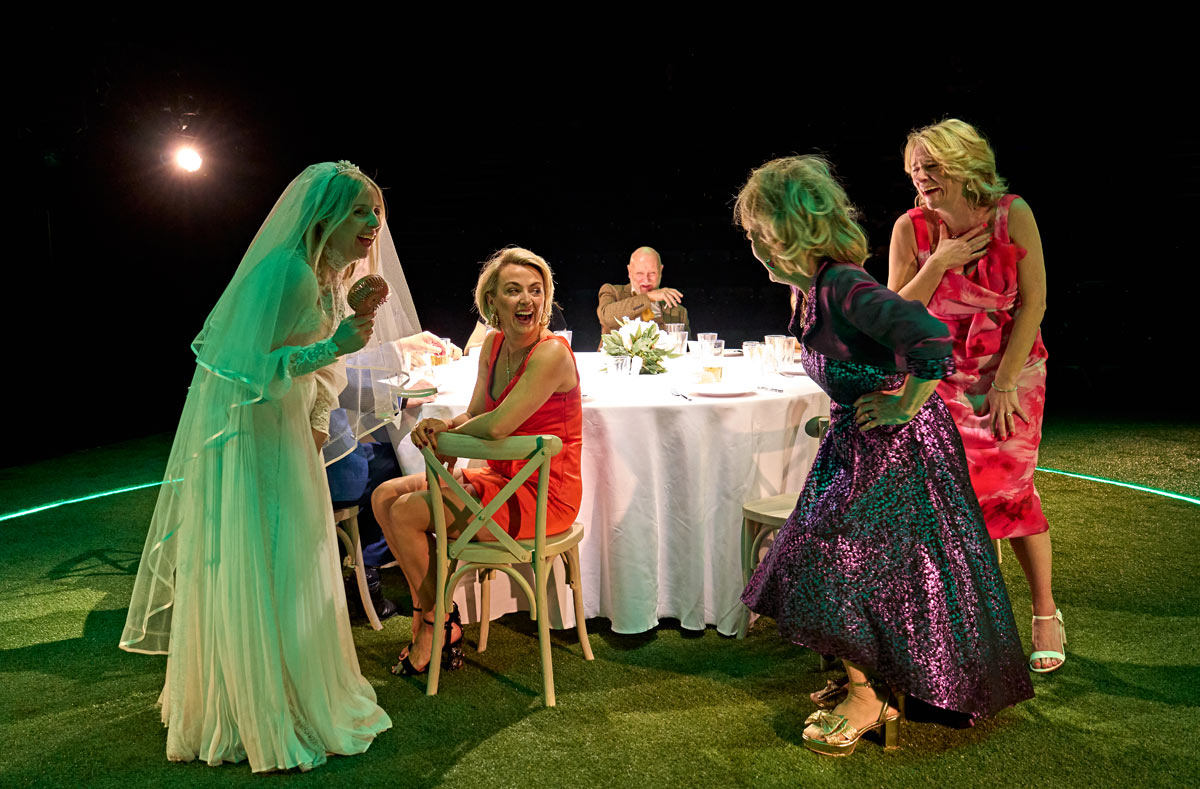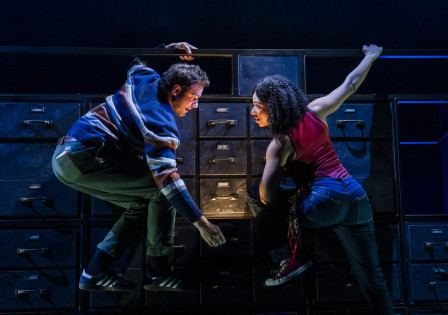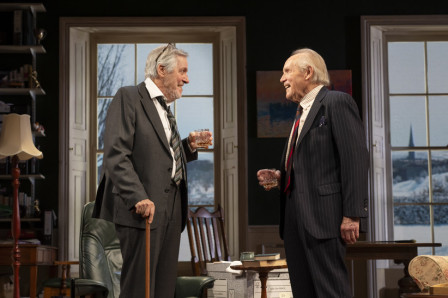Review: TILL THE STARS COME DOWN at National Theatre, Dorfman
In a post-industrial East Midlands town where the largest employer was once the coal mines but is now a warehouse, three sisters prepare for the wedding of one of their number to a Polish immigrant. The scene is primed to unveil a gamut of familiar tropes — class disenchantment, resentment of immigrants, decades-old family feuds and of course the appalling spectacle of drunken wedding dancing en masse. But Beth Steel's caustic family drama also has some unexpected skeletons in its closet, and the excellent cast seem hell-bent on freeing them.
 Sinéad Matthews (Sylvia), Lisa McGrillis (Maggie), Philip Whitchurch (Uncle Pete), Lorraine Ashbourne (Aunty Carol) and Lucy Black (Hazel) in Till the Stars Come Down at the National Theatre. Photo (c) Manuel Harlan
Sinéad Matthews (Sylvia), Lisa McGrillis (Maggie), Philip Whitchurch (Uncle Pete), Lorraine Ashbourne (Aunty Carol) and Lucy Black (Hazel) in Till the Stars Come Down at the National Theatre. Photo (c) Manuel Harlan
Sylvia and Marek's wedding day starts with a cacophony of women, bustling and faffing, preening and preparing, exchanging familial familiarities and furtively side-stepping potentially ugly, unresolved matters. Each member of the tightly knit cast contribute to the layers whilst never losing their very individual experience of what it means to be part of this family. In the presence of barely suppressed anger, grief, regret and yearning for the unattainable, it falls to alcohol to act as catalyst for revelations from which there can be no return to a state of polite pretension.
Underpinning the simmering spectacle, in director Bijan Sheibani's production which is elegantly staged in the round, is an unavoidable truth, that one person's success is another's reason for resentment. Here, that flows effortlessly into expressions of bigotry and betrayal. In fact so much is thrown into the melting pot, that by the end the result should be an unwholesome mess, but precisely the opposite is true. The strength of individual characterisations elevates the drama from a mere cacophony of emotions and it is further driven by raw truth and an unending stream of hilariously dumped one-liners. In particular, Lorraine Asbourne as Aunty Carol (from the moment she unexpectedly pitches-up in curlers during the opening scene), gives off an air of dangerous unpredictability rendering her crass and gem-like observations all the more shocking and funny. Elsewhere, there is a tangible sense of loss and heartbreak in Lisa McGrillis' stoic performance as Maggie as she tries in vain to resist pursuing her own hopes of happiness, knowing the potential impact it will have on her sisters, in particular Hazel played by Lucy Black, whose powerlessness has left her bereft of solutions and vulnerable to feelings of bitterness and resentment. When events take and dark and menacing turn, it is considerate and worldly Marek (Marc Wootton) who bears the brunt and it is left to his new wife Sylvia (Sinéad Matthews) to act as the audience's conscience in calling-out injustice.
You may think, what family doesn't have its problems? But rarely have they been this messy, or entertaining.
Latest News

 Cast announced for the World Premiere of ALLEGRA
4 February 2026 at 15:02
Cast announced for the World Premiere of ALLEGRA
4 February 2026 at 15:02

 Cast announced for European premiere of THE JONATHAN LARSON PROJECT
4 February 2026 at 14:14
Cast announced for European premiere of THE JONATHAN LARSON PROJECT
4 February 2026 at 14:14

 Review: LOST ATOMS at Lyric Hammersmith
4 February 2026 at 12:08
Review: LOST ATOMS at Lyric Hammersmith
4 February 2026 at 12:08

 I'M SORRY, PRIME MINISTER at Apollo Theatre - Production images released
4 February 2026 at 10:41
I'M SORRY, PRIME MINISTER at Apollo Theatre - Production images released
4 February 2026 at 10:41